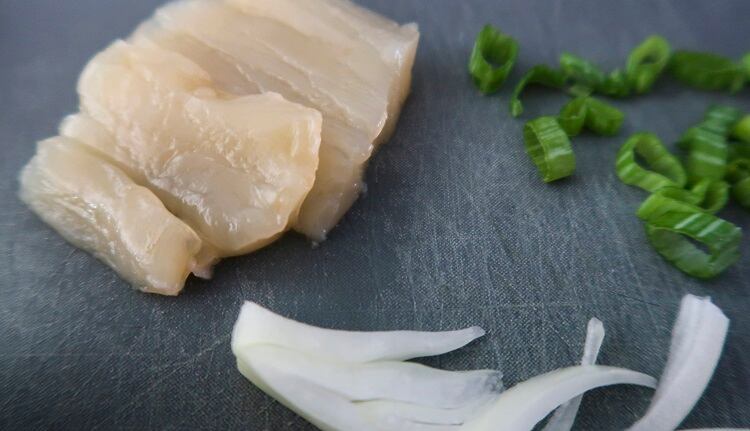The funds give Aqua a competitive edge in the race to bring to market protein alternatives that more closely mimic their animal counterparts at a price-point people can afford by helping the company build out its pilot facility, scale up production and bring on key talent.
At Future Food Tech in San Francisco, FoodNavigator-USA caught up with Aqua’s CEO Anne Palermo who shared how her company is approaching the plant-based seafood segment, where it sits in the competitive landscape, the category’s market potential and where she see the category – and Aqua – going.
Strategically priced for access and to fuel sustained growth
To cover the high cost of creating the next generation of alternative proteins that deliver on taste without compromising nutrition, many companies must launch products at a higher price point than their animal counterparts – limiting consumer adoption and slowing growth.
But Aqua Cultured Foods’ is able to launch its plant-based seafood at price parity by strategically mimicking proteins that already are premium priced and sold at a markup through foodservice – a move that Palermo explains will allow the company to cover the cost of scaling, at which point it should be able to leverage its larger size and demand to bring prices down to match those at retail.
“There was recently a study that came out … by Kearney that shows that for every 1% decrease in cost, there's a 4% increase in adoption of alternative protein products. So keeping that in mind, we are trying to really launch our products at price parity. Now we're launching a price parity to a more premium seafood like a premium tuna that's going to be used in sushi in order to really get that early adoption,” Palermo said. But, she added, “we have a line of sight to beat price parity very, very quickly.”
She explained that the company will be able to lower its prices quickly for retail as it scales in part because it plans to work with co-packers, rather than build out a full-size facility. To do this though, the company needs to first “lock in all our technology” at a pilot facility where it can work out any kinks.
“Our pilot scale [facility is almost ready], we are finishing the production of our incubation chambers and our fermentation rooms right now, so they should be done at the end of the month,” she said.
At that point, the company will be able to produce about 5,000 pounds a month of finished product, which Palermo said is enough to supply select high end restaurants this summer.
“But then also … what this pilot program is allowing us to do is lock in all our technology to help us identify potential contract manufacturers” that can help us make commercial quantities “almost immediately.”
Biomass fermentation allows Aqua to skip hurdles others face
Palermo explained Aqua also is able to move faster than some competitors in the race to create whole-cut plant-based seafood because it uses biomass fermentation rather than other emerging technologies, like cell cultivation, which are not as developed or which face additional regulatory and scaling challenges.
In addition, Aqua’s fermentation process allows it to address many consumer concerns about existing plant-based alternatives, including long lists of ingredients that include starches and protein isolates or contribute off-notes that need to be masked.
“We’re taking advantage of biomass fermentation, and the reason this is so exciting in the industry is biomass fermentation is able to grow and create products using fungal proteins and mycelium,” which “creates a very clean label product that is non-GMO,” and which is “potentially better for you than the real thing because there is no mercury, there is no heavy metal poisoning, and then on top of that we also have naturally occurring fibers, which the American diet is really lacking,” Palermo explained.
She added biomass fermentation uses components that are already in the food system and recognized as GRAS, “which helps us to accelerate our path to market.”
Finally, because biomass fermentation rounds out off-notes, the company won’t need masking agents like other plant-based options, which means “we’re left with a product whose basic ingredient label is just our nutritional fungi proteins and water.”
Plant-based seafood’s market potential is ‘massive’
While many plant-based protein companies are focused on beef, chicken and pork, Palermo said she chose seafood because it is a protein of choice in regions of the world where the population – and demand for high-quality protein – are growing the fastest.
“We just reached a global population of 8 billion people back in November, we're positioned to reach a population of 10 billion people globally. It's not just that there's a massive increase in population growth. It's where these individuals and population growth is concentrated. And they're predominantly concentrated in China and Southeast Asia. In this part of the world, 70% of all seafood is consumed. And so what we're seeing is a massive shift in demand … but due to overfishing and climate change, fish are disappearing from our ocean. And so what we're seeing is just the supply and demand is not being is not being met properly,” she explained.
With this growth driver, she added the alternative seafood market is “massive,” with recent reports pegging it about $611 billion and growing at a compound annual growth rate of 6.23%.



